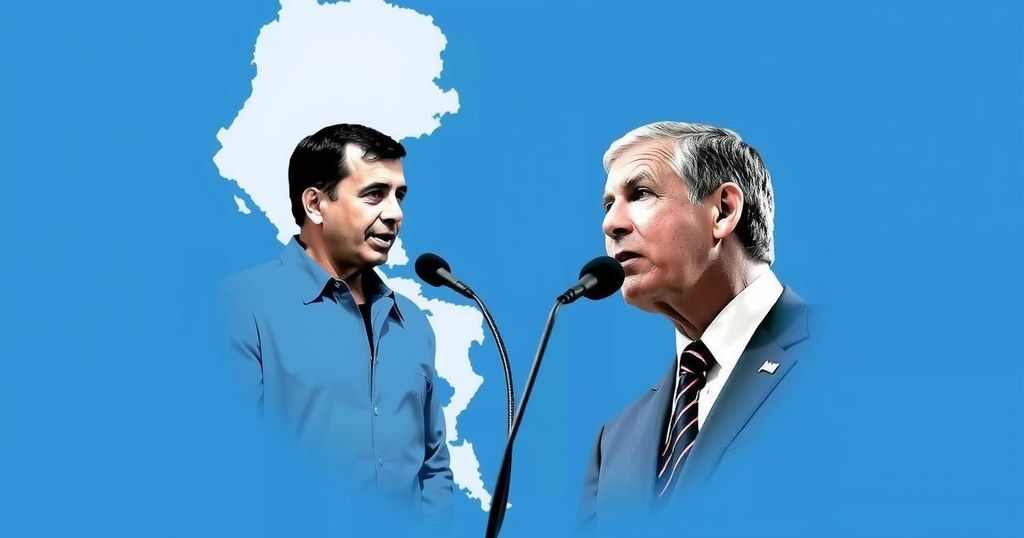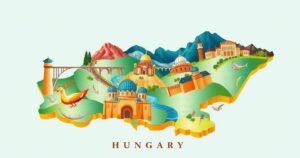Uruguay Set for Presidential Run-Off Election Next Month Amid Political Dynamics

Uruguay is set for a run-off presidential election on November 24 between centre-left candidate Yamandu Orsi and centre-right candidate Alvaro Delgado. Orsi received approximately 43.2% of the votes, while Delgado garnered about 28%. The election contrasts with right-left divides seen in other Latin American countries, with citizens expressing satisfaction with government performance amid concerns over escalating crime.
Polling stations in Uruguay have concluded the presidential election, revealing a forecast for a run-off vote between two candidates: Yamandu Orsi, representing the centre-left Frente Amplio party, and Alvaro Delgado from the centre-right Partido Nacional. According to estimates from Equipos Consultores, Mr. Orsi, who is a former history teacher and the local mayor, garnered approximately 43.2 percent of the votes, while Mr. Delgado, aged 55, achieved about 28 percent. Andres Ojeda, a lawyer and media figure, claimed the third position with projections indicating 15.5 to 16 percent support. The run-off is set for November 24. Pre-election forecasts had suggested that no candidate would surpass the 50 percent threshold necessary for an outright win, thereby leading to the anticipated scenario of a run-off. In addition to the presidential voting, Uruguayans also participated in referendums proposing to lower the retirement age to 60 and to alter regulations on police conducting nighttime raids; early exit polls suggest that both measures were likely rejected by the electorate. Notably, the political dynamics of this election highlight a departure from the extreme right-left divides observed in other Latin American nations, such as Argentina, Brazil, and Mexico, with both leading candidates reflecting a significant overlap in their policy positions. Public sentiment towards the current government, headed by President Luis Lacalle Pou of the Partido Nacional, remains relatively favorable, with a 50 percent approval rating. However, the ruling coalition faces challenges in addressing escalating concerns regarding violent crime, predominantly associated with drug trafficking, a pressing issue for many voters in the nation of approximately 3.4 million residents. Under the constitution, President Lacalle Pou is ineligible for re-election following his initial term; hence, the upcoming election holds considerable significance for Uruguay’s political future. Noteworthy is Mr. Orsi’s alignment with former President Jose Mujica, a historical figure in Uruguayan politics, whose recent participation in the electoral process, despite health challenges, signals the enduring impact of his legacy in the country.
The context surrounding the presidential election in Uruguay reflects a crucial turning point in the nation’s political landscape. Unlike many Latin American markets that have recently experienced significant shifts towards rightist governance, Uruguay’s election illustrates a nuanced dynamic whereby both leading candidates represent moderate and overlapping platforms. The electoral atmosphere is colored by public concerns surrounding crime and an overall satisfaction with the government’s economic performance. Given President Luis Lacalle Pou’s tenure and the constitutional limitations on his candidacy, the election may not only reshape the immediate political landscape but also influence long-term policies and governance strategies in Uruguay.
In summary, the upcoming run-off vote in Uruguay’s presidential race brings to the forefront two candidates with distinct backgrounds yet similar policy positions. The election is significant, reflecting broader political trends within the region while simultaneously addressing pressing concerns regarding crime and governance. As voters head to the polls again on November 24, the implications of their choices could steer Uruguay towards a marked political shift or maintain the status quo established over the past five years.
Original Source: www.aljazeera.com







